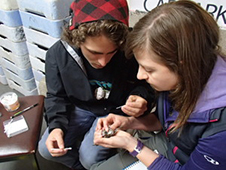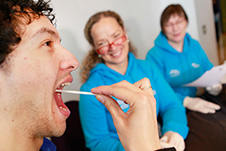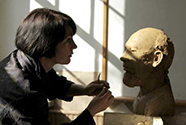Dunnocks - and what bird sperm can tell us
 This year's bumper kakapo breeding season has highlighted a significant problem in the conservation of rare species - nearly half of the more-than-120 kakapo eggs that have been laid are infertile, and a significant number of fertile eggs are dying before they hatch.
This year's bumper kakapo breeding season has highlighted a significant problem in the conservation of rare species - nearly half of the more-than-120 kakapo eggs that have been laid are infertile, and a significant number of fertile eggs are dying before they hatch.
Scientists suspect much of the problem lies with the male birds, which may be 'shooting blanks' or have poor quality sperm.
The problem is not unique to the endangered kakapo, and Department of Anatomy post-doctoral researcher Helen Taylor has spent the last year on a bird sperm-collecting tour of the country to see if she can get some clues to what is going on.
Hear Dr Taylor talking about her research on National Radio's 'Our Changing World'.
Listen to "Our Changing World': Dunnocks - and what bird sperm can tell us
Africa to Aotearoa
 Professor Lisa Matisoo-Smith has spent the last two years taking DNA samples from New Zealanders in various locations around the country and overseas. As of July 2015 the sampling phase of the Africa to Aotearoa project has finished. Hear Professor Matisoo-Smith talk about the initial results with Kim Hill on National Radio. They will surprise you!
Professor Lisa Matisoo-Smith has spent the last two years taking DNA samples from New Zealanders in various locations around the country and overseas. As of July 2015 the sampling phase of the Africa to Aotearoa project has finished. Hear Professor Matisoo-Smith talk about the initial results with Kim Hill on National Radio. They will surprise you!
Listen to Africa to Aotearoa
Professor Matisoo-Smith is also featured in this 'Our Changing World' program: New Zealand's Super Diversity
North Island brown kiwi genome
The Department's research is not limited to humans. Researchers in the Gemmell Lab blend genomics with ecology, population, conservation and evolutionary biology, to examine a range of interesting, and frequently fundamental questions in organisms ranging from invertebrates to mammals. In this 'Our Changing World' Program Gemmell Lab researcher Dr Helen Taylor (@ 06:23) and PI Professor Neil Gemmell (@ 16:41) talk about the sequencing of the North Island Kiwi.
Listen to 'Our Changing World': North Island brown kiwi genome.
Art and anatomy
 Dr Louisa Baillie completed her PhD in Anatomy. Hear Dr Baillie talk with Kim Hill on National Radio about how she combines art and anatomy.
Dr Louisa Baillie completed her PhD in Anatomy. Hear Dr Baillie talk with Kim Hill on National Radio about how she combines art and anatomy.
Listen to Art to Anatomy
We Had Names
'We Had Names' is a radio documentary that tells the story of the 975 people who were buried in unconsecrated grounds on the site of the old Kilkenny Workhouse at the height of the Irish potato famine between 1847 and 1851. Listen to Dr Jonny Geber and others talk about this ground breaking discovery.
Listen to We Had Names
